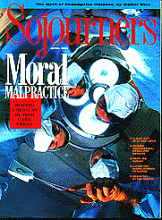There is a turning these days toward the Sermon on the Mount not merely as a high ideal, but as authoritative and practical. That is fundamentally important, because the Sermon on the Mount is the central Christian text for peacemaking and justicemaking. It is not the only text; peacemaking and justicemaking are major themes throughout the biblical story. They are essential to the gospel.
But as long as we tiptoe around the Sermon on the Mount, our stance is fundamentally weak.
Christians in the first few centuries saw the Sermon on the Mount as the central statement of Christian faith and life; no scripture was more quoted and referenced by Christian theologians in the period before the Nicene Council in the fourth century. It is the locus classicus for Christian peacemaking--the place where Jesus taught most extensively about peacemaking. When Anabaptists and Quakers in the 16th and 17th centuries recovered and developed the peace-church tradition, they based it most clearly on the Sermon on the Mount.
Similarly, much of the centuries-long debate between pacifism and just war theory is based on disagreement about the meaning and authority of Jesus' teachings in the Sermon on the Mount. Going back to the Sermon on the Mount is going back to the root of the discussion.
Not Human Striving But God's Transforming Initiative
Interpreting the Sermon on the Mount as a declaration of high ideals toward which we should strive causes resistance. The ideals seem so high that people feel guilty just thinking about them, and they seem impractical in a realistic world. Nevertheless, the language of high ideals, heavy demands, or harsh sayings still sometimes creeps into the interpretation of even the best New Testament scholars, in spite of their emphasis elsewhere on the context of grace. Such language is not faithful to the New Testament context.
Read the Full Article

